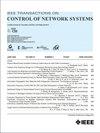具有轮循协议和传输延迟的脉冲系统的动态量化输出反馈控制
IF 4
3区 计算机科学
Q2 AUTOMATION & CONTROL SYSTEMS
引用次数: 0
摘要
研究了一类具有动态量化、通信延迟和轮循协议的脉冲系统的输出反馈控制问题。采用动态量化机制和轮循协议的主要目的是克服通信网络带宽有限的问题,节省通信资源。此外,考虑了网络引起的传输延迟,使闭环系统最终成为脉冲时滞系统。利用构造的脉冲时滞Lyapunov泛函,给出了保证系统指数稳定性的一个新的充分条件。然后,应用半正规划方法推导出预期的输出反馈控制器增益。最后,通过实例验证了所构建的控制策略的实用性和有效性。本文章由计算机程序翻译,如有差异,请以英文原文为准。
Dynamic Quantized Output-Feedback Control of Impulsive Systems With Round-Robin Protocols and Transmission Delays
In this article, the output-feedback control problem is investigated for a class of impulsive systems under dynamic quantization, communication delays, and round-robin protocols. The main purpose of employing the dynamic quantization mechanism and round-robin protocols is to overcome the limited bandwidth of the communication networks and save communication resources. Moreover, the network-induced transmission delays are considered, which result in the final closed-loop system as an impulsive delayed one. With the help of the constructed impulse-time-delayed Lyapunov functional, a new sufficient condition is developed to guarantee the exponential stability of the addressed system. Subsequently, the expected output-feedback controller gains are derived by applying the semipositive programming method. Finally, illustrative examples are proposed to examine the practicality and effectiveness of our constructed control strategy.
求助全文
通过发布文献求助,成功后即可免费获取论文全文。
去求助
来源期刊

IEEE Transactions on Control of Network Systems
Mathematics-Control and Optimization
CiteScore
7.80
自引率
7.10%
发文量
169
期刊介绍:
The IEEE Transactions on Control of Network Systems is committed to the timely publication of high-impact papers at the intersection of control systems and network science. In particular, the journal addresses research on the analysis, design and implementation of networked control systems, as well as control over networks. Relevant work includes the full spectrum from basic research on control systems to the design of engineering solutions for automatic control of, and over, networks. The topics covered by this journal include: Coordinated control and estimation over networks, Control and computation over sensor networks, Control under communication constraints, Control and performance analysis issues that arise in the dynamics of networks used in application areas such as communications, computers, transportation, manufacturing, Web ranking and aggregation, social networks, biology, power systems, economics, Synchronization of activities across a controlled network, Stability analysis of controlled networks, Analysis of networks as hybrid dynamical systems.
 求助内容:
求助内容: 应助结果提醒方式:
应助结果提醒方式:


